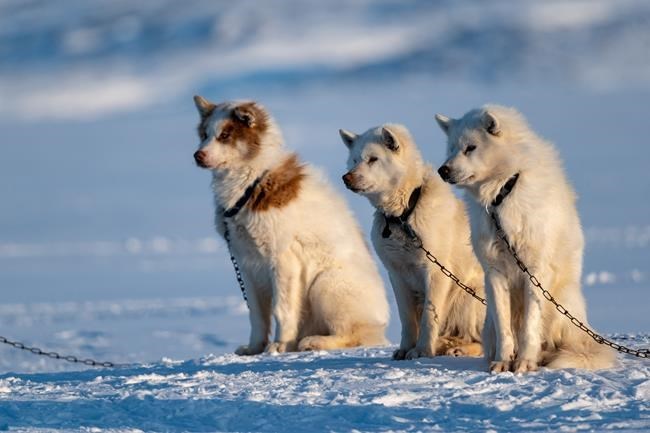IQALUIT — Somewhere in the Canadian Arctic dozens of dogs run over ice and snow under Nunavut's high April sun as they pull sleds with racers in tow.
Fourteen teams took off from Arctic Bay six days ago and are expected to arrive in Igloolik on Monday, a trek of 500 kilometres.
The Nunavut Quest is an annual dogsled race that has taken place in the High Arctic for more than 20 years, although it doesn't always cover the same ground. In 2014, for example, mushers raced the 400 kilometres between Igloolik and Pond Inlet.
Because of cancellations during the COVID-19 pandemic, it’s been two years since the Quest has been run.
"It's so good to have it back," Crystal Natanine, one of the organizers, told The Canadian Press over the phone from her home in Arctic Bay.
"People are really excited."
There are seven camps where racers can stop between Arctic Bay and Igloolik. They were set up before the race with food and support for the participants and their dogs.
Natanine said it took a lot of work to prepare, especially to organize dog food, usually in the form of seal meat.
“There’s not a lot of seal around here this year for some reason and we don’t know why,” she said.
The organizers had to supplement some of the seal with dry dog food bought from a grocery store.
For generations, Inuit and qimmiit, or sled dogs, lived together in Nunavut. The dogs were fundamental for transportation and hunting.
Between 1950 and 1975, the federal government forcibly relocated Inuit, separated families and slaughtered thousands of their dogs.
The colonial practices are documented in a report from the Qikiqtani Truth Commission and through its interviews with 350 Inuit between 2007 and 2010.
In 2019, the federal government apologized to Qikiqtani Inuit for the dog slaughter and forced relocations, and gave $20 million to the Qikiqtani Inuit Association to develop healing programs and cultural projects.
Following the apology, the association started a revitalization project, which supports Inuit to put together and maintain dog teams.
Hagar Idlout-Sudlovenick, director of social policy, said the funding allows the association to support racers in the Quest rather than them having to do much of their own fundraising and financing, as has been the case in the past.
“It’s a very happy story,” she said.
“At one point, dog teams were almost wiped out. It has slowly been coming back."
Idlout-Sudlovenick said she was surprised by the age of the participants at an annual dog team gathering earlier this year.
“Now, the majority of dog team owners are younger,” she said.
That's reflected in the 14 racers taking part in the Nunavut Quest this year. They are all under 50 and the youngest is 22 years old, Natanine.
"These young generations are excited to learn traditional ways. Teenagers are very much interested in learning," she said.
"I hope we can at least have a little something from our traditional ways. This helps with that."
The Quest's first-place prize is $20,000. The racer who comes in second will take home $10,000.
This report by The Canadian Press was first published April 22, 2022.
___
This story was produced with the financial assistance of the Meta and Canadian Press News Fellowship
Emma Tranter, The Canadian Press




